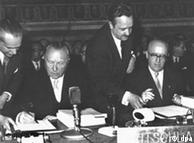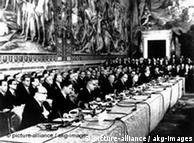History | 16.11.2009
The Treaties of Rome - March 25, 1957
 Bildunterschrift: Großansicht des Bildes mit der Bildunterschrift: German Chancellor Konrad Adenauer (left) places his signature on the treaties
Bildunterschrift: Großansicht des Bildes mit der Bildunterschrift: German Chancellor Konrad Adenauer (left) places his signature on the treaties
The events that took place in Rome's Capitoline Museum on March 25, 1957 would have been unconceivable only years before. German Chancellor Konrad Adenauer (1876 - 1967) and his counterparts from France, Italy and the Benelux countries signed the Roman Treaties, officially establishing the European Economic Community. But more than that, the treaties signaled a new friendship between Germany and its former war enemies - only 12 years since the end of World War II.
In particular, the Franco-German alliance proved to be the motor driving the European unification movement forward. From this point on, German and French politicians were the main forces behind first the EEC and, starting in 1965, other "European communities," for example, the European Atomic Energy Community (Euratom), the European Coal and Steel Community (ECSC or "Montanunion"), and finally, the European Union, founded in 1992. Through politics, they showed that a friendly relationship between Germany and France could stabilize the once turbulent center of the European continent.
Economic cooperation
 Bildunterschrift: Großansicht des Bildes mit der Bildunterschrift: Robert Schuman
Bildunterschrift: Großansicht des Bildes mit der Bildunterschrift: Robert Schuman
The idea of establishing a common European market reaches back to 1951. That's when the "Montanunion" was created to give member states duty-free access to coal and steel during the reconstruction period after World War II. The Montanunion proved to be a cornerstone of Germany's post-war recovery, but it also fulfilled another important function. French Foreign Minister Robert Schuman (1886 - 1963) was convinced that inner-European peace could only be sustained if goods essential to war - such as coal and steel - were subject to communal controls. At the same time, the basic conditions for recovery in Western Europe were guaranteed through this equal access to the most important means of production. The young Federal Republic of Germany profited greatly from the Montanunion. Its introduction ended the British occupation authority in the Ruhr region, which at that time was rich in coal. It also brought about the end of sanctions imposed by the Allied powers after World War II.
Political cooperation
 Bildunterschrift: Großansicht des Bildes mit der Bildunterschrift: The assembled heads of state at the signing of the Treaties of Rome
Bildunterschrift: Großansicht des Bildes mit der Bildunterschrift: The assembled heads of state at the signing of the Treaties of Rome
The Montanunion contributed greatly to reconstruction on the European continent. Now, after this example of economic cooperation, the Treaties of Rome followed up with political cooperation. The negotiations were tough; they were almost abandoned with no outcome several times. But at the beginning of June 1955, a breakthrough was achieved at a conference held in Messina, Sicily. The delegates from the six states (Germany, France, Italy, and the Benelux countries) agreed to create a European domestic market, and establish the European Atomic Energy Community, or Euratom. After two years, the contracts were finally ready. The Treaties of Rome ensured free trade, the harmonization of social standards, and the unfettered movement of labor, services and capital. In future, trade and economic relations with third parties would be organized communally. Common "supranational" institutions would oversee the activities of the European Economic Community, as well as the common, peaceful use of atomic energy, which was seen by many at the end of the 1950s as the energy source of the future.
Foes become friends
In addition to the economic benefits that unification offered to all those involved, the decision by five European countries to extend the olive branch to Germany was a decisive factor. Unlike the Treaty of Versailles after World War I, cooperation - not conflict - would be used to deal with the fallout of war. Within the framework of common European development, the country responsible for the war was given the chance to rehabilitate itself. The Germans grasped this chance with a surprising amount of initiative, creating the widely admired Economic Miracle - something that would not have been possible without the European network. On March 25, 1957, the Treaties of Rome became the birth certificate of a unified Europe, which over 50 years later, continues to build on political unification.
Author: Matthias von Hellfeld (dc)
Editor: Andreas Illmer

Comments